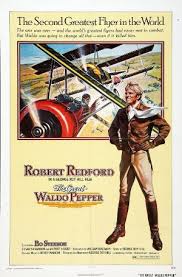
THE GREAT WALDO PEPPER
US, 1975, 108 minutes, Colour.
Robert Redford, Bo Svenson, Susan Sarandon, Geoffrey Lewis.
Directed by George Roy Hill.
Most audiences should enjoy this film. Robert Redford, oozing charm, plays a star pilot of the 20's whose horizons are the sky and aerial skill (beautifully and excitingly photographed.) But he is a dreamer, too late to be a hero of the personal dogfights of World War 1, caught in a fading career of aerial spectacle before aviation became functional. He tells a dream of his fighting a battle in the war; and the charm and optimism of the film lies in his being able to live his dream in a Hollywood re-creation of the war. An entertainment, a Hollywood myth, a wonderful wish-fulfilment fantasy.
1. The tone of the title and the emphasis on greatness, the photos at the beginning and the end. the mythical aspects of a hero?
2. How did the film explore the theme of greatness: the greatness of Waldo's dreams, their unreality. the ambitions. in the fulfilment of fantasy in the final achievement of dreams? How real was the exploration? How idealistic? How delightful was such an exploration of an ideal?
3. How well did the film communicate the atmosphere of the air? The aerial photography. the experience of flying. the exhilaration of the small plane. the tricks in the air. the dangers, the thrills, the potential for damage and destruction? The background of the first World War and the pioneering? The challenge of the battles and their excitement? The skill? The effect on the pilots?
4. The film's comment on the First World War: a pioneer war in the air. personal warfare, the heroism of the stories and the mutual admiration ? What personal flavour did this give the memory of war? The war in the air as seemingly remote from the harshness of trench warfare? The world of heroes and dreams?
5. The film's emphasis on Waldo telling the story so many times: the very lengthy recounting of the story to the family, his telling it to the girlfriend and its being interrupted and the truth being told, the dream being told at the end when it became a true story? What did the story of this combat symbolise for Waldo? And the fact that it was fulfilled?
6. How attractive a man was Waldo? Robert Redford's charm and personality? The presentation of him doing his job? His making people happy? The joy of the rides? The devotion of the boy with the petrol and taking him for the ride? What kind of romantic hero did Waldo Pepper stand for?
7. The realities of the '20s: jobs, times changing, the clash with the rival pilot? The callous overtone of the con-man in Waldo Pepper?
8. How enjoyable were the sequences in the aerial fair? The training, the tricks, the comradeship The attitude of the manager? His dramatising of the dangers? His cynical comments about the audience? The people and their response to danger? Did they really want death?
9. The attractiveness of the girl? Her relationship with Waldo and his companion? The eagerness of her wanting top billing? The nature of the stunt? Her being frozen in fear? The suddenness of her death? what did the film say were the consequences of her death? How did they highlight the harsh realism behind the romantic unreality?
1O. The importance of the sequences of Waldo at home? The support at home and yet his wandering? The closeness of his friend in building a plane for him? Their desire to be champions with the loop? The contrast of the domestic sequences and the excitement of his career? His inability to settle?
11. The drama of the loop and the plane crash? Waldo’s horrified reaction and his attack of the people? Did the audience share this horror and Waldo’s attack of the audience?
12. Did the audience support the supervision of Waldo's flying and banning him from the air? Was this necessary in the mid 20s? Was it too dangerous for men like Waldo to fly? Would they jeopardise the growing air industry?
13. How enjoyable were the Hollywood sequences? The portrayal of the silent films and their making? The comedy of the stunt men?
14. How important were the encounters between Waldo and the German Air-ace? The humanity and the friendship of their discussion of the manoeuvres in the war? Their reconstructing the challenge and the battle for the film? The irony that film-making can recreate a situation and let people live it again? Or live it for the first time? The film as being able to give reality to a fantasy works? The enjoyment of the battle? Its appropriateness as a climax for the film? The effect on each of the protagonists? On Waldo's friends and the supervisor?
15. What were the major themes for this film? In terms of humanity. dreams, heroism?